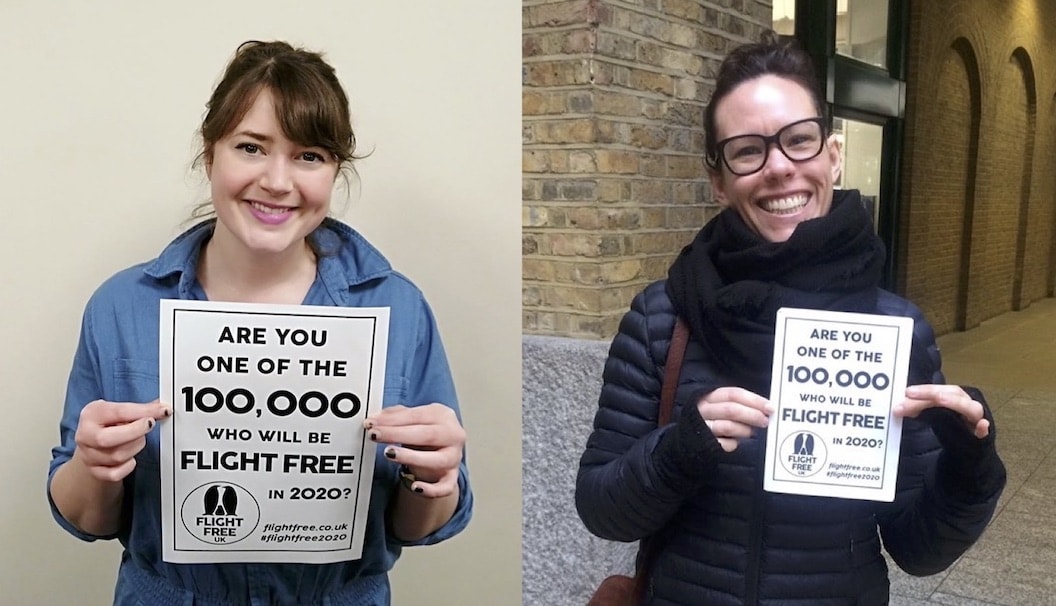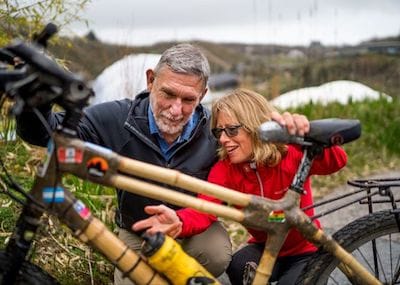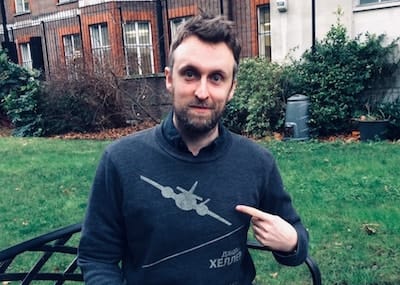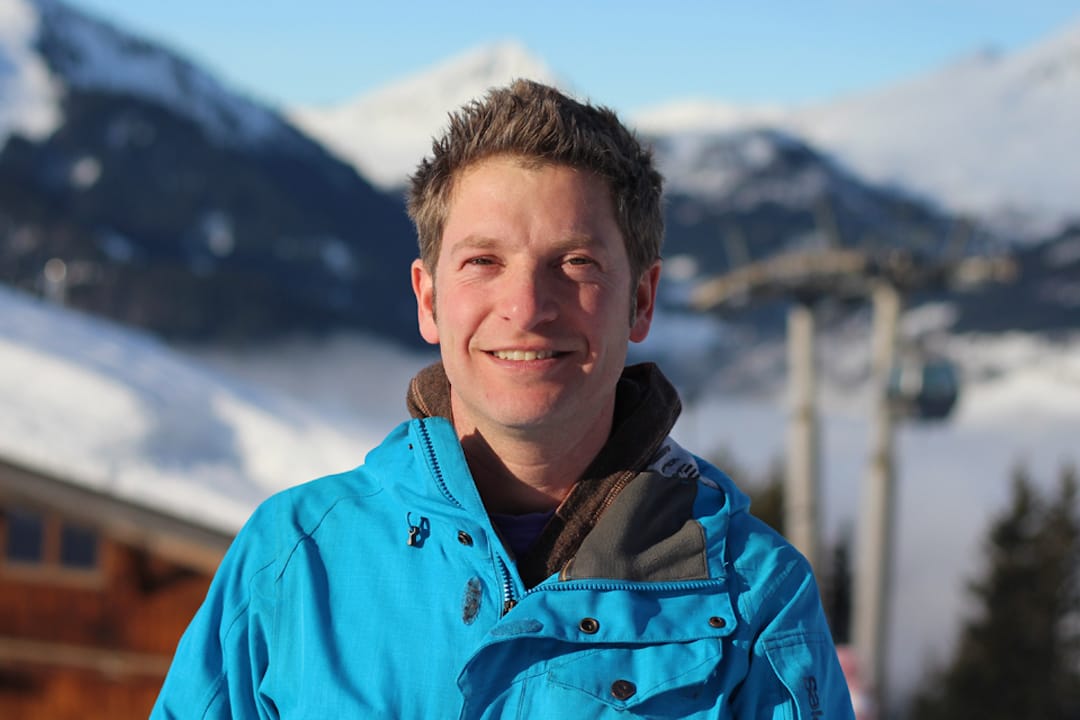This podcast is episode 1 of our #FlightFree2020 series. You can listen to the podcast here, and access the rest of the series at our podcast page.
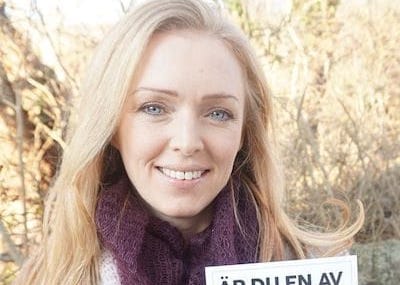
Our January episode is all about New Year’s Resolutions, so our conversation is with Maja Rosén, whose New Year's resolution two years ago inspired her to start the flight free campaign in Sweden, which asked 100,000 Swedes to take a year off flying, and led to the creation of flight free campaigns here in the UK and beyond. You can listen to the full interview on our podcast page.
Maja wrote a blog for us explaining how her New Year’s resolution to dare to be socially inconvenient and talk about flying and the climate crisis was the best resolution she ever made, and the only one she’s ever kept.
Flight Free UK:
We’ve worked closely with Maja throughout the past year and we’re always so inspired to speak to her and hear how the whole thing started.
Maja:
I personally gave up flying 11 years ago, and I wondered why so many people kept flying even though we're in a climate emergency, but usually stayed quiet. So I gave myself a NY resolution to be a bit brave and ask people questions.
One of my first conversations was with my neighbour, because he had asked us to look after his cat while he went to Vietnam. I felt really awkward about bringing it up but I said to him, "I've promised myself to talk about this", and I asked him if he knew much about the climate crisis and if he had considered the climate impact of his flight. To my surprise he wasn't offended and we had a really good conversation. It made me realise that I could and should talk about this, and that I can make a difference in this way.
"I wondered why so many people kept flying, but I usually stayed quiet. So I gave myself a NY resolution to be brave and ask people questions."
Since then I haven’t talked about anything else! So many people have told me they feel really inspired by the campaign, and everyone I’ve spoken to has said they are really glad that I said something, and that they wish they’d realised this sooner. And that’s why this is the best NY resolution I’ve ever made.
Flight Free UK:
What a great resolution, and what great results. But it takes a lots of bravery to do it. We’ve been campaigning on this issue for a year now, and we’ve found that it’s much easier to speak to people we don't know than it is to talk to our friends, especially our friends who fly a lot. We asked Maja if she'd had the same experience.
Maja:
Now my friends know what I’m doing for a living, they know I’m not questioning them, so they don’t really get offended. The campaign is not directed at them – it’s about all flights.
The reason I’m doing this is that I want us all to do everything we can to solve the climate crisis.
But yes, it's much easier to speak to strangers than those close to you because it doesn’t involve emotions. So I would really encourage people to be brave and go out and speak to people that they don't know. Take our fliers and go in a group, so it's clear that you’re representing an organisation.
"The reason I’m doing this is that I want us all to do everything we can to solve the climate crisis."
We go out into town, or to train stations, or to universities, and speak to people. I've been surprised at how many people are willing to stop and talk to us – most people do, once they realise we're not asking for money!
I spoke to a group of young students and asked them if they would consider flying less, and if they talked to each other about the climate crisis. It turns out that they didn't usually talk about it, though one of them said that he wished they did, so that was nice.
Flight Free UK:
So, we can see that having these conversations is really important but it tends not to happen, probably because you don’t want to be ‘that person’ who just goes on about the climate crisis all the time.
But *not* talking about it seems to be how we’ve got into this climate mess. If it's not on most people's radars, it’s certainly not going to be on the political radar, even though we’ve known about this for decades.
There's a blog about this on our website, called We need to talk about the climate crisis, written by one of our activists, Maria.
Maja:
I think that if we are to solve the climate crisis we need to become more aware of how serious the situation is. If you look at the people around you and they don’t seem concerned I think it's difficult to get just how urgent this is.
Some people, like experts in the media, say, "We know what’s going on but we’re not doing anything about it," but I don’t think that’s true. There are so many people not aware yet, and they would be if they knew what was at stake.
"There are so many people not aware yet, and they would be if they knew what was at stake."
Many of the people active in our campaign had been frequent fliers until recently. Now they understand what's going on, they want lots of other people to know as well.
Flight Free UK:
Maja has written a guide to help others talk about this. It's called We Need to Talk About Aviation, and you can find it at weneedtotalkaboutaviation.org
Maja:
The best thing is when someone writes to me and says I’ve read your guide, which contains my best advice about talking to people, and also has responses to the most common counter-arguments.
Flight Free UK:
Our campaign here in the UK is quite reliant on social media, which can be a really good way to spread the message. But there’s a risk that you get trapped in the social media bubble, where you end up only talking to people who already agree with you. Still, sharing the pledge on Facebook is good, because lots of your friends would see it, even those who might not be aware of the climate impact of flights. There’s loads of information on our Facebook page, including testimonials from some of the people who've pledged.
Maja:
Through social media we try to encourage everyone to talk about this, because if we can encourage them to be brave, then I think this could spread quite quickly and change could happen fast.
We’re trying to encourage everyone to write a story about why they’ve pledged. The best thing is when people write, I used to be like you, I used to love travelling, and then I tried this and now it feels really good.
Flight Free UK:
We've also found that the testimonials are a great way to share the campaign. Our testimonials are photos of people with the pledge card, and a sentence or two about why they’ve signed. It makes it so much more personal and powerful when you can see the people who are taking part, because it's not just about numbers, it’s about people, and it shows why they care about this.
A large part of the campaign is to create a social shift, a mindset shift. So asking people to give up something for a year is a good way to inspire them to try something, without saying, you can never fly again. But Maja has found the impact has gone beyond just that year.
Maja:
Many people think of giving up flying as a huge sacrifice before they make the decision. But once the decision is made it's like they change their perspective straight away. Instead of focussing on what they can no longer do, they focus on how good it is for the climate, and on everything they still can do. Everyone I know is so happy about making the pledge to stop flying and think it’s the best decision they’ve ever made.
"People think giving up flying is a huge sacrifice before they do it. But once the decision is made they change their perspective straight away."
The Flight Free 2020 campaign is a good way to encourage people to try it for one year. I started this campaign here last year and once people had stopped flying for a year, they were more likely to stop flying completely until we’ve solved the climate crisis. So it's a good way to get people thinking in another way about this.
Flight Free UK:
For many people, 2019 was the year we woke up to the climate crisis. So we asked Maja if she thought there was a difference between people's reactions this year and when she started the campaign.
Maja:
Comparing this year to last year, there's a huge difference. Before, the focus was on political solutions. But there's been a huge change. Now, people are much more willing to make personal changes because they are aware of the climate impact of flying and they have been considering flying less.
Flight Free UK:
We asked Maja about whether she sees the campaign as a success.
Maja:
Yes, definitely. It’s different to how I thought it would be – I thought it would be much easier to collect pledges. But I would never have dreamed that the campaign I started here would spread to be a global campaign. I feel so pleased that I’ve had the opportunity to reach out to millions of people – going from not being brave enough to speak to my closest neighbour – so I definitely think this is a success. But I so want to reach the goal of 100,000 pledges because I do think that some people would think that it's not successful because we haven’t reached the goal. But even if people don't make the pledge, it will still encourage them to fly less because they've heard of the campaign.
Flight Free UK:
We totally agree, and it goes back to that great resolution. Just one person taking action can make so much difference. It’s very easy to feel that you as an individual can’t do anything, and to not try. But Maja has shown that what seemed like a tiny decision simply to start talking about this has turned into a global campaign.
Now, we’re often asked why flying is even that much of a big deal? So we asked Maja: why are we specifically talking about flights?
Maja:
Sometimes people ask me, why do you focus on flying when there are so many other things we should do? Not flying is one of the most important things you can do as an individual to reduce your emissions. But it's also such a good way to get more people engaged in the climate issue.
It gets more people understanding that it really is a climate crisis and we can't keep living the way we do. And when we show that other people are prepared to take action by giving up flying, it really drives it home. It's a good way to get people involved. Then it's no longer about giving up flying – if you accept that you can’t keep flying, you also try to reduce your emissions in all other ways.
Flight Free UK:
And that’s the thing – there are many things we can do to reduce our emissions, but flying is the big one, and if we accept that, everything else follows more easily. But behaviour change campaigning is really hard, because we can feel totally overwhelmed with the scale of the task, and when we feel like we’re the only ones who care it’s easy to give up. But for Maja the opposite has been true – the campaign has given her a sense of purpose and has shown her that she’s not alone.
Maja:
I used to be really concerned about the climate crisis and it really worried me and I would try not to think about it, but it was always at the back of my mind and would make me worried or sad. But now that I feel that I’m doing everything in my power to solve this, I feel that my life is so much easier and so much happier. I wasn't able to relax before because I felt I wasn’t doing everything I could, and I found that stressful. But now I’m doing everything I can it's such a relief to be true to myself. And this year I have got to know so many other people who feel the same, and we’re striving for the same goal, and I don't feel lonely anymore. Before I felt like the only one who was having these concerns.
Flight Free UK:
Well we’ve found Maja to be one of those inspiring people and we’re grateful to her for being brave and getting this issue out there.
Our final question to Maja was what were her top tips for talking to people about the climate crisis?
Maja:
This should be obvious but it's also the part people struggle with, and it is just to be nice. Most people say, I can't talk about the climate crisis because I get so frustrated and angry. That's the worst thing you can do because people shut off and you won’t be able to reach them with your message.
Also be understanding that they don't think the way you do. Show them that you don't think they are selfish or they don't care, but show them that it’s completely normal not to do everything they can to solve the climate crisis, because we act like people around us, and if we see other people not changing their lives, it's difficult to understand what that means for the climate crisis. But if you show that you understand that they don’t get it yet, but they would if they knew, you are more likely to reach them.
"Many say, I can't talk about the climate crisis because I get frustrated and angry. That's the worst thing you can do because people shut down."
Also, ask questions and listen to their answers. I've been surprised to understand how little most people think about this. When people say they don’t want to give up flying it’s not because they don’t care, it’s because they don’t realise how important it is to do it.
Of course, we want political solutions but if we are to solve the climate crisis, we can’t just force people to do it, we have to get people to care about it and want to solve it. It’s not possible to reach everyone, but there are so many people out there who would do everything in their power to solve the climate crisis if they knew this isn't something that will happen to someone else in the distant future, it will affect us and the people we know. I really think that more people would fight for the climate if they understood this.
Flight Free UK:
So, the message is, get out there and talk to people, and try and have those climate conversations. You might be surprised at the responses you receive. Thanks to Maja for speaking to us. We hope you enjoyed hearing what she had to say and are inspired to make a New Year’s resolution.
Could you dare to be socially inconvenient and start having climate conversations? Could your resolution be to take the flight free 2020 pledge?
Listen to the full interview on our podcast page.
Next month we'll be hearing from Daniel Elkan, founder of Snow Carbon, a website that focusses on flight-free options for skiiers. In the meantime you can find us on Facebook, on Twitter/Instagram, or at our website.
Credits: interview conducted and recorded by Anna Hughes. Intro voiceover: L. Sophie Helbig. Sound effects: Josh Hill.

